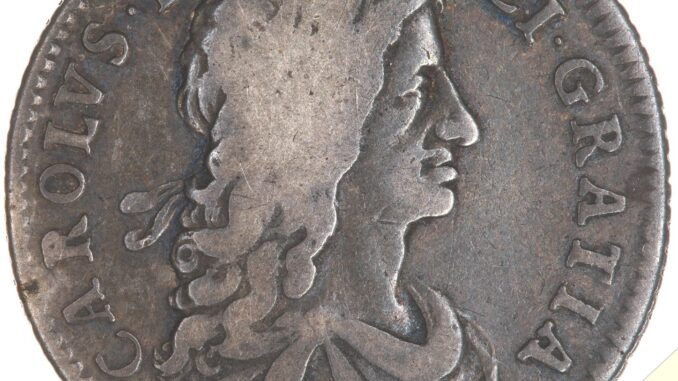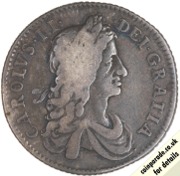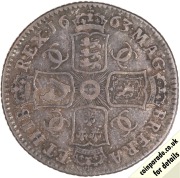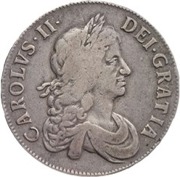
 The 1663 Shilling - Charles II (Milled, First Bust)
The 1663 Shilling - Charles II (Milled, First Bust)By 1663 the Royal Mint was ready to end hammered coinage and replace it with the milled coinage created by the machine of Peter (Pierre) Blondeau. John and Joseph Roettier, brothers and members of the famous engraver family from the Netherlands, engraved the dies in such a way as to prevent clipping. Coins had either engraved or milled edges.
This is a silver shilling of King Charles II, minted in 1663 at the Tower Mint in London. Diameter 25mm and weight of 5.79g. SCBC: 3371. There is a First Bust Variety, with small changes to the hair and other minor modifications.
The Obverse shows laureate and draped bust of King Charles II, facing right. Legend "CAROLVS II DEI GRATIA".
The edge is straight milled.
 The Reverse shows a crowned cruciform coat of arms (Four crowned shields, bearing arms of England, Scotland, France and Ireland) with Garter star in centre and Royal cipher (interlinked pairs of Cs) in quarters. Legend "MAG BR FRA ET HIB REX" with date split across top crown.
The Reverse shows a crowned cruciform coat of arms (Four crowned shields, bearing arms of England, Scotland, France and Ireland) with Garter star in centre and Royal cipher (interlinked pairs of Cs) in quarters. Legend "MAG BR FRA ET HIB REX" with date split across top crown.Image credit: Museums Victoria
Mintage: Not known
Minted at The Royal Mint
More information (monarch, year, mint, country, category) can be found below coin listings.
Below are some coins currently being offered on eBay. As an eBay Partner, We may be compensated if you make a purchase.
List items on:
List items on:
Charles II (1660-1685)
 Charles II was King of England, Scotland, and Ireland. He was king of Scotland from 1649 until his deposition in 1651, and king of England, Scotland and Ireland from the 1660 Restoration of the monarchy until his death.
Charles II was King of England, Scotland, and Ireland. He was king of Scotland from 1649 until his deposition in 1651, and king of England, Scotland and Ireland from the 1660 Restoration of the monarchy until his death.The reign of Charles II is an interesting period for coin collectors. Charles issued many coins. When his father, King Charles I was executed, Charles II was forced into exile and Civil War raged in England. The first coins were those of Charles I, issued in the name of Charles II, minted around the country to pay armies. After the Reformation of the Monarchy, Charles II issued his own coins and from 1670 hammered coins were gradually replaced with milled coins.
The regnal years used on Charles II coins were:
1668:VICESIMO; 1669:VICESIMO PRIMO; 1670:VICESIMO SECVNDO; 1671:VICESIMO TERTIO; 1672:VICESIMO QVARTO; 1673:VICESIMO QVINTO; 1674:VICESIMO SEXTO; 1675:VICESIMO SEPTIMO; 1676:VICESIMO OCTAVO; 1677:VICESIMO NONO; 1678:TRICESIMO; 1679:TRICESIMO PRIMO; 1680:TRICESIMO SECVNDO; 1681:TRICESIMO TERTIO; 1682:TRICESIMO QVARTO; 1683:TRICESIMO QVINTO; 1684:TRICESIMO SEXTO.
Charles II coins usually use the latin spelling: Carolus II.
Category: Shillings
The Shilling (written 1/-) is one-twentienth of a pound, worth 12 old pence (5 new pence). It is traditionally a silver coin, but since 1947 it has been made from cupro-nickel. Shillings are known as 'Bobs'.Shillings are old coins and the English shilling has been around since about 1549, although there were 12 pence coins before that called Testoons from about 1489. The British shillings was the continuation from 1707.
After decimalisation on 15 February 1971, the coin was replaced by the five new pence piece. Originally, the 5p coin was the same size as the shilling but was later made much smaller.
Which Mint: The Royal Mint
The Royal Mint is the designated place for the UK to mint coins. It dates back well over 1000 years and is a Government-owned company. Formed in the reign of Alfred the Great about the year 886, during the period 1279-1812 it was generally referred to as The Tower Mint as it was housed at the Tower of London. The Master of The Royal Mint has included famous figures such as Sir Isaac Newton.
Since 2010 it has operated as Royal Mint Ltd, a company owned by HM Treasury, under an exclusive contract to supply all coinage for the UK although it also produces medals and coins for other countries. It is currently located at Llantrisant, Wales.
Country of Origin: United Kingdom
The United Kingdom (UK) is the Union of England, Scotland, Wales and Northern Ireland. It is often refered to as Great Britain (GBR). It has a long, rich history. The orignal coinage was Pounds, Shillings and Pence but since decimalisation on 15 February 1971, it is £1 = 100p, that is One Pound = 100 pence. The coinage of the UK is also a long history, the Royal Mint being established as long ago as 886AD when coins were hammered. Today there is perhaps 30 billion coins in circulation, and many (numismatic) collectors coins and sets are issued frequently in gold, silver and other metals.








